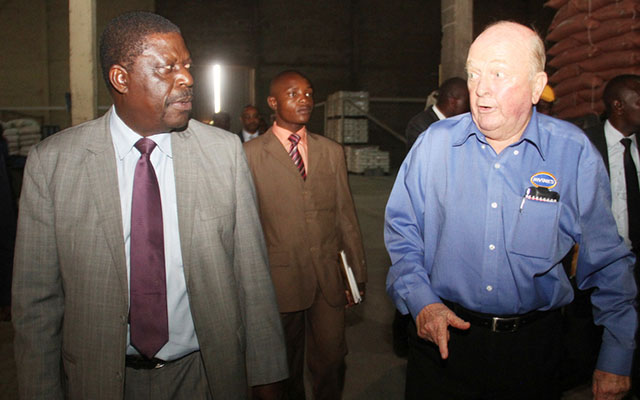Reduce maize producer price: Irvine

Irvine’s Zimbabwe (Private) Limited chief executive David Irvine (right) explains to Industry and Commerce Minister Mike Bimha the feed production process during a tour of the company’s plant in Harare yesterday. — (Picture by Kudakwashe Hunda)
Business Reporter
ZIMBABWE’S maize producer price, at $390 per tonne is driving prices of value added products up and making poultry producers and agro processors uncompetitive in export markets, Industry and Commerce Minister Mike Bimha heard yesterday.
Integrated poultry operation, Irvine’s Zimbabwe (Private) Limited chief executive David Irvine told Minister Bimha who was touring the company that if Government could get the prices of maize down, it would lead to a decline in prices of maize products.
“We are basically taking maize and soya and converting them into chicken and eggs. The maize price is wrong.
“It is set at $390 per tonne, a level for
those who produce two tonnes per hectare. We should not be paying to cover just small producers.
“The price in South Africa is about $170 per tonne and if you add transport to that you get to about $270 per tonne. That is the import parity that is roughly where the price should be.
“If we get that my cost of chicken will go down. Instead of putting 200 000 a week through that plant I will increase to 250 000 per week and I’ll be able to lower the price and sell more.
“If the Grain Marketing Board buys maize that is fine but if there is maize on the local
market we have to go in and buy,” said Mr Irvine.
Maize and soya make up about 55 percent of Irvine’s costs and this has a negative bearing on pricing of finished products.
Other challenges that were highlighted to the Minister include the bureaucracy and costs of permits for operations and for imports of raw materials that are not available locally.
Mr Irvine also said the process of obtaining export permits as tedious.
He said for the importation of maize or
soya, Irvine’s requires an Agricultural Marketing Authority license which costs — $1 000; Non GMO certificate — $40; plant phytosanitary certificate — $30; National Bio Safety
Agency — $40 and Ministry of Agriculture, Mechanisation and Irrigation Development permit — $70.
The company also has to pay plant quarantine Department — $30 (per truck); National Bio Tech Inspectors at Border — $30 (per truck); plant quarantine department inspector at border — $30 (per truck); port health inspectors — $20 (per truck); importing company’s expenses — $200 (per order).
Of concern to the poultry producer is that apart from the cost, most of the permits take up to three weeks to obtain.
“We had some people from the Ivory Coast here this week and they are going to let us know next week if they want our fertile eggs.
“If they are going to get the eggs they want them (delivered) next week but I have to wait for three weeks to get a permit.
“We are going to lose three weeks’ worth of exports.
“If someone phones me up and says can you sell me something I want to say yes it’s coming tomorrow,” said Mr Irvine.
